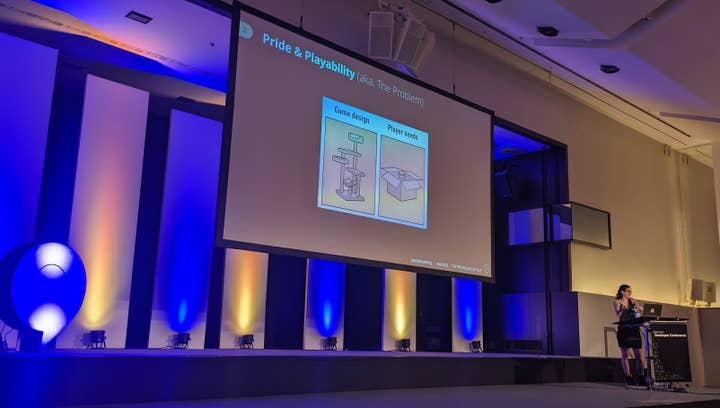Adapting your game's vision to benefit your players
At Devcom 2023, Funcom's Anna Brandberg also shared "easy UX wins" to help devs make their games more accessible
At Devcom's keynote today, Funcom's lead UX designer Anna Brandberg made a case for taking the time to truly understand players.
In a talk entitled 'The Psychology of Play: The Power of Understanding Your Players', Brandberg — who's worked on The Sims, Candy Crush Saga and, most recently, Metal: Hellsinger— encouraged developers to think about the player's journey and emphasised the need for your vision to align with players' vision.
"Often the focus is on ourselves, our own talent and our own achievements and making our own big, special games that are going to change the world," she said. "But in fact, what I'm going to talk about today is the opposite of that. I'm going to tell you [to] stop focusing on yourself entirely. And to start thinking about someone else.

"Some hard to swallow pills: it's not about you. Making successful games often has very little to do about how good you are at your particular craft."
Throughout her keynote, Brandberg detailed why understanding the player is important, because, more often than not, meeting your players' needs means meeting your business' needs.
"What we have to remember is that the people playing our games are people," she continued. "And it's so easy for us to focus on the numbers, how well our games are doing, the ratings, your KPIs, daily revenue, player relation, all of these things.
"But I have a world shattering secret for you: behind each of those numbers is a person. All those numbers that people are so focused on at work, they're people. We as companies need to keep reminding themselves that we should care about people."
She highlighted that "players don't care about [developers'] genius" and that sometimes you need to step back and pivot based on player's feedback — even if it's not really what you had in mind initially. Again, your vision should match the player's vision once you've started asking for feedback.
Brandberg advocated for the importance of user research, the power of user segmentation, A/B testing and analysing and watching your playtesters.
"It's not about you. Making successful games often has very little to do about how good you are at your particular craft"
She then detailed a few "easy UX wins" that developers can easily implement straight away to start their journey on understanding player and catering to their needs
Visible feedback
"How many times have you pressed something unsure if anything happened?," Brandberg said. "It's infuriating. Always have visible feedback. Make sure that every action gets a response — players should know when they're interacting with an element in the game."
Have consistent UI elements
"You wouldn't randomly change street sign designs in real life," she pointed out. "Consistency is key. What it does is help players keep their focus on the stuff that is actually important, the stuff that you want them to be focusing on, instead of getting distracted by other things, or getting confused by stuff that's not really important here and now. So keep things consistent."
Have clear tutorials
"You know that overwhelming feeling of learning a new game with no guidance? Tutorials need to be clear, intuitive, and optional for returning players," Brandberg said. "At least make them feel like you're not holding their hand. Players, myself included, can have an ego – I don't want anyone to tell me what to do, I want to feel like I figured it out myself."
Customisable control schemes
"Everyone is unique and one size fits all design doesn't always cut it. People have different accessibility needs, [so] make sure that people can adjust things to their liking. This is one of the easy ways to increase comfort and immersion, and also allow all players to be able to access your games. Games are for everyone."
Accessible fonts and colours
"You don't want players squinting trying to read something tiny," Brandberg said. "Make sure fonts are legible, [with good contrasts]. Consider that there's such a massive part of your player base that have different accessibility needs, and accessibility means so many different things. Make sure that everyone gets to enjoy your game. Designing things simply from the beginning often doesn't mean it requires extra effort. And the reason why I put this in as an easy UX win is because this isn't something that you should tack on when you've already designed your entire game.
"If you prioritise this from the beginning, when you choose your two options, if you do that mindful of accessibility from the beginning, choosing colour scheme A or colour scheme B takes just as much effort. But having to redo your colour scheme at the end? That's double the effort."
Intuitive menus and navigation
"Fumbling through confusing menus [isn't fun]. Keep things simple again. Players should be able to find what they need without a second thought. If I have to think about what it is that I need to be doing: it's not working. I want to be able to click through things and never have to stop and wonder, 'I just need to like figure out where my next quest is'."
Have clear error messages
"Cryptic error messages can be confusing as well. Tell me why it's wrong. Ideally, if something goes wrong, we want to know how to fix it. Same thing goes with players."
"I have a world shattering secret for you: behind each of those numbers is a person"
Concluding her talk, Brandberg reminded the audience that games can have the power to change people's lives and that as a result, developers should use the power they hold for good.
She encouraged devs to prioritise meaningful design, challenge themselves, and create a culture of welcoming feedback.
"Be ready to pivot based on players' insights," she concluded. "Be ready to put your ego aside and create something that someone else really, really wants to play."
GamesIndustry.biz is a media partner for Devcom 2023.

